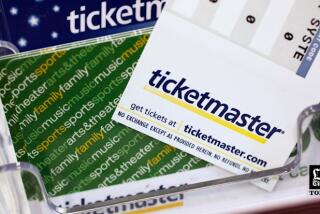Brokers are buying up precious tee times at L.A. city golf courses. Golfers are desperate and outraged

- Share via
Golfers at Los Angeles municipal courses have complained for years that it is nearly impossible to score a tee time.
Many have long suspected that forces more sinister than excess demand and limited supply were gobbling up coveted foursomes. But they had little to back up their claims.
Enter Dave Fink, a 35-year-old golf teaching pro and L.A. native, who this month popped off to his 200,000 followers on Instagram about a booming black market where brokers charge up to $40 as a booking fee.
So began a movement known as #FreetheTee.
Fink grew up playing on city courses and said one of his “fed up” friends went to Griffith Park and asked Saturday morning golfers how they got their tee times.
“Finally, somebody told him the truth: ‘Hey there’s this guy, and the only way you can get in touch with him is through this Korean messaging app called Kakao,’” Fink recounted.
Fink showed his viewers a menu of the broker’s offerings: tee times listed by course, including four at Balboa Golf Course, one at Harding and three at Hansen Dam.
“This is what he’s charging per tee time, per person. OK? $30 for non-peak hours. $40 per tee time,” he said. “This is literally crazy and it’s” very unfair.

“When the weekend comes around, and we want to ... go and play golf and we can’t because the earliest tee time available is 4:30 in the afternoon, now you know why,” he stormed. “Apparently everybody knows about it. Everybody knows about it!”
The confirmation of long-held suspicions has roiled the L.A. golf world, with players clamoring for the city to crack down. And when some of the dominant brokers are Koreans selling mostly to fellow Koreans — on courses designed to cater to all stripes of Angelenos — the controversy is riven with race and class politics.
Golf has long had an image as a country club sport, and city courses are a vital outlet for those who can’t afford private memberships, with their five- and six-figure initiation fees.
“This is a public good,” said Patrick MacFarlane, 35, who grew up playing on L.A. municipal courses and serves on the city’s golf advisory committee. “It’d be like if someone took over a public swimming pool and said there would be surge pricing.”
The brokers are peddling times at courses across Southern California. But golfers believe the problem is most acute in L.A., where city courses in Griffith Park, Rancho Park and Hansen Dam offer unrivaled convenience and affordability, typically charging around $35 per person, higher on weekends and holidays. The fee is the same for nonresidents.

Slots open up at 6 a.m. for golfing nine days ahead. And every morning, in a matter of seconds, the reservations for these prime city courses in Griffith Park and on the Westside disappear on the city’s online booking platform, GolfNow. Golfers say that without using a broker, they get tee times primarily through last-minute cancellations or a waitlist, where they must stand by in person from five minutes to several hours. Sometimes the list doesn’t get tapped at all.
After Fink’s online videos gained traction, the L.A. Department of Recreation and Parks announced an investigation, roping in the city attorney’s office and the staff at GolfNow, a subsidiary of NBC Sports Next.
“I know people are frustrated,” said Rose Watson, spokesperson for the recreation and parks department. “At the end of the day, it’s not right, it’s not fair.” She said that “the city is on top of it” but asked for “a little more patience.”
According to Watson, the investigation’s findings will be made public and shared with the Board of Recreation and Park Commissioners, whose five members oversee
the golfing program and are appointed by Mayor Karen Bass.
It is impossible to know exactly how many tee times brokers are scooping up or how much the Korean brokers contribute to the dearth of golfing slots.
But within the Korean golf community, it’s common knowledge that brokers use senior memberships to book morning and early afternoon tee times and resell them for a profit, according to several interviews by The Times.
“All the Koreans know them,” James Lee, 57, said in Korean. “At least all the older people know them.”
This week, Lee pulled out his phone in between putts on the practice green at Griffith Park and scrolled through his contacts on KakaoTalk, the popular Korean messaging app referenced by Fink. He found a contact named “Golf tee time” in Korean and showed his phone to a Times reporter, saying, “This bastard.”
Lee denied that he secured his tee time via the broker, saying he had snagged a canceled reservation.
“James waited over two hours yesterday for a tee time and ended up just having to go home,” a worker called out from the pro shop’s front desk as Lee checked in for his 9:45 a.m. spot.
Amid these frustrations, Fink has become the public face of the demand for accountability.
“This is an issue that affects everybody who pays taxes in the city, and anybody who plays golf as well, so I just felt like it was my duty to say something,” Fink said in an interview.

He hosted a meet-up last weekend at Rancho Park Golf Course, where dozens of golfers stopped by. Several honked when they saw Fink, yelling out, “Free the tee.” His videographer and editor, Brandon Wu, filmed much of it.
Golfers there described the typical morning ritual — logging in at 5:56 a.m. and waiting. “Golfers know where to hold the mouse so you can click quickly,” said Charlie, who gave only his first name because he’s often searching for tee times at work. “Six hours worth of tee times are gone in seconds.”
Helping Fink are fellow linksmen outraged by the profiteering of public sport, including Joseph Lee, who runs SoCal Dream Golf Club, a group of more than 100 Korean and Asian golfers.
Lee has long been aware of the brokers. He has even used a broker three or four times before, sharing with Fink many of the screenshots that have become viral evidence of the problem.
Lee said that in 2021, a broker charged $20 per tee time, which a golfing foursome often splits. Now it’s nearly double. Most golfers reach out to a broker via text message on KakaoTalk, and the transaction typically is in Korean. “The first question he asks is, ‘Who referred you?’” Lee recalled.
Next, the golfer informs the broker roughly when and where they want to play.
The broker responds with the available tee times, which are secured on a first-come, first-served basis once a deposit goes through, Lee said, with customers sending money via Venmo.
Initially Lee saw no issue: “I thought it wasn’t illegal, and we’ll pay $5 each and play.” But he quickly realized the brokers were “a poison” and had “occupied all the tee times, even the weekdays and weekends.”
Joseph Lee said that well before the recent uproar, he shared his concerns with the officials who run golf at the Department of Parks and Recreation.
A popular broker, Ted Kim, is “getting worse and bigger,” Lee said, adding, “All the golfers in metro L.A. feel so pissed off.”
In a brief interview with The Times, Kim said that he uses up to five devices and relies on unspecified “friends” to secure tee times. He said he is on the same playing field as every other golfer in L.A. and does not use bots to game the system.
“It’s not like I’m taking advantage of technology. I’m booking myself,” Kim said. “I’m not doing anything illegal.”
Kim’s account lined up with Lee’s: Golfers message him through KakaoTalk with the date and time they would like to play, along with their player card. He logs on by 6 a.m. and books a tee time for them nine days in advance.
Kim said he profits a couple thousand dollars a month, and he initially put an altruistic sheen on his business.
“I’m just helping Korean seniors, because they have a right to play golf, because all the Koreans play golf, right? Without my help, they actually struggle,” he said.
Pressed further, however, Kim acknowledged that he also books tee times for “middle-aged men.” He insisted he books tee times under each player’s name and does not transfer them to others.
How exactly brokers secure tee times and sell them remains murky.

Many golfers claim that the brokers are exploiting a benefit that senior citizens get — a 10-day advanced booking window, when non-seniors get nine days. The city denied that a 10-day window exists, but several golfers said they’ve seen it firsthand.
Some, like Lee, say that a reservation booked nine days in advance will be canceled and immediately booked under a new customer’s name.
Watson, the spokesperson for the city recreation department, said this type of handoff “technically hasn’t been proven yet” but vowed that officials will scrutinize the data.
Others have theorized that scalpers have relied on bots to scoop up available tee times.
Rick Reinschmidt, who manages golf for the city, has said that the city’s booking vendor has bot-squashing software that has flagged “thousands” for unusual activity, according to minutes of the city’s golf advisory committee.
In the last three weeks, the city suspended 23 users from its booking system. In the last year, 133 were suspended, according to Watson.
One broker, a woman in her 40s, told The Times in Korean that she booked for 10 golfers, all Korean seniors, using her phone and her computer. She said she recently stopped booking because of the negative online discourse surrounding the issue and requested anonymity for that reason.
“My customers want me to start reserving tee times for them, but I’m too scared now because of how big all this has gotten,” she said.
Sometime last year, a Korean elder at her church asked her for help booking a tee time, unfamiliar with the technology, the broker said. The one senior quickly turned into a group that requested tee times through KakaoTalk.
She said she did not have a set fee and that her customers paid her $20 to $40 as a tip. The broker said she made less than $1,000 a month.
“I can see why people are upset at us brokers, because we are booking for others, and it’s not like we didn’t get paid — we did,” she said. “But I’m only helping people who asked for help. I never approached people trying to get them to use my services.”
Watson said that Reinschmidt has given assurances that city employees are not involved in any of the tee time brokering — but she said that any allegations of corruption would be investigated.
Fink has started selling #FreetheTee merchandise, and this week he urged his followers to attend the city’s golf advisory committee meeting on Monday.
The volunteer panel’s meetings are usually sedate affairs, and Fink promises to shake things up.

“If you love golf, and if you love making golf more accessible and affordable, and if you want to ... free the tee, you will be there with me,” Fink said. “We’re gonna get some answers.”
More to Read
Sign up for Essential California
The most important California stories and recommendations in your inbox every morning.
You may occasionally receive promotional content from the Los Angeles Times.












